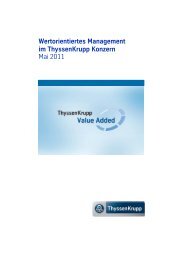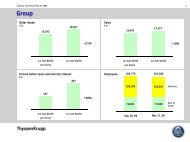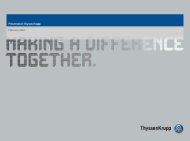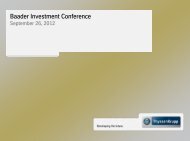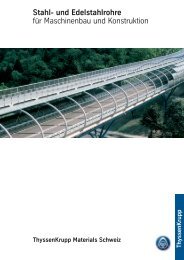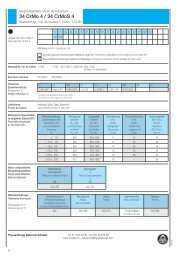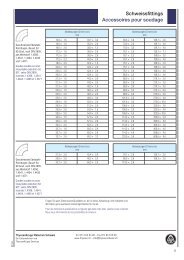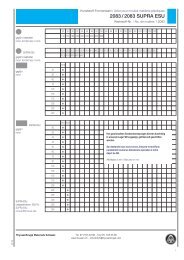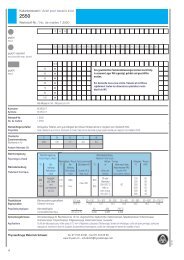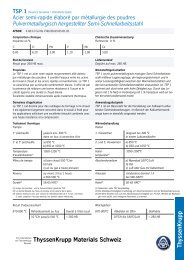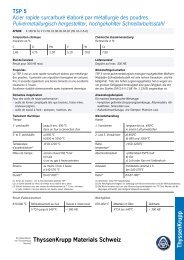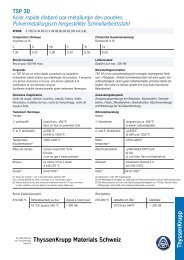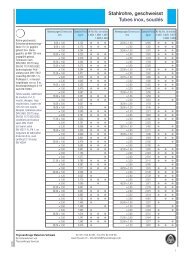Engineering
Engineering
Engineering
Create successful ePaper yourself
Turn your PDF publications into a flip-book with our unique Google optimized e-Paper software.
Management report on the Group<br />
2.7 Management report on the Group Expected developments and associated opportunities and risks<br />
Pages 177-185 177–185<br />
The effectiveness of of our compliance<br />
program was audited by by KPMG in in 2011;<br />
more information on compliance and and<br />
KPMG's KPMG‘s report can be be found on on the the internet<br />
at internet www.thyssenkrupp.com/en/konzern/<br />
at www.thyssenkrupp.com/en/<br />
compliance.html<br />
konzern/ compliance.html<br />
112 | 113<br />
Procurement risks<br />
Depending on the market situation, prices for raw materials and energy can fluctuate significantly. We<br />
safeguard our competitiveness by adjusting purchasing prices and securing alternative procurement<br />
sources. The geographical distribution of orders makes us less vulnerable to regional supply bottlenecks. To<br />
hedge against raw material price swings, in particular for nickel and copper, we also use derivative financial<br />
instruments – mainly commodity forward transactions. The use of these instruments is subject to strict<br />
rules. Details of these risk areas are provided in the Notes.<br />
The energy transition in Germany will permanently increase the price of electricity with the rise in the share<br />
of renewable energies and the associated need to expand the electricity grids. On top of this there are costintensive<br />
regulatory requirements for the electricity and gas networks of our major production locations. To<br />
counter the risk of rising energy prices we pursue a structured energy procurement policy. Furthermore all<br />
business areas are further increasing their efforts to save energy and recycle waste so as to prevent<br />
greenhouse emissions and conserve natural resources.<br />
Risks associated with acquisitions, disposals and restructurings<br />
Active portfolio management is a key element of our corporate development. We constantly monitor and if<br />
necessary make provision in the balance sheet for risks associated with the disposal or acquisition of<br />
companies, business activities and real estate and with restructurings.<br />
Legal risks associated with third-party claims<br />
Claims can result in legal risks. In the associated legal proceedings ThyssenKrupp is represented by its own<br />
experienced corporate counsel, if necessary with the additional support of external attorneys. We minimize<br />
claims for damages under product liability law through the high quality of our products.<br />
When contractual partners assert claims against ThyssenKrupp under plant construction, supply and service<br />
contracts, we examine the individual claims carefully and make provision where payment obligations are<br />
considered likely.<br />
Our strict compliance program reduces the risk of antitrust violations and corruption at all levels of the<br />
Group. In the Compliance Commitment the Executive Board of ThyssenKrupp AG states that antitrust<br />
violations and corruption are not tolerated in the Group. We monitor and regularly update our supplementary<br />
policies and publications as well as our internal compliance organization.<br />
We have separated the legal counsel service from compliance in terms of organization and staff. Within<br />
compliance the advisory function was also segregated from general principles and compliance<br />
investigations. In May 2011 we resolved further measures which will be implemented in the framework of a<br />
multi-year program. These measures include an increase in the number of employees in the compliance<br />
organization, namely by appointing regional compliance officers in selected regions.<br />
We appointed KPMG AG to audit our compliance program to auditing standard 980 of the Institute of Public<br />
Auditors in Germany (Institut der Wirtschaftsprüfer e.V.) for the period April to September 2011. The audit<br />
covered the structure, implementation and in particular the effectiveness of our compliance program, and<br />
was therefore the most extensive audit possible under IDW PS 980. Due to the special rules applying in the<br />
USA, the subsidiaries in this country were not part of the audit. KPMG confirmed that the compliance<br />
management system at ThyssenKrupp AG is appropriately implemented and was effective in the period<br />
reviewed. Insofar as recommendations for compliance work were made on the basis of the audit findings,<br />
their implementation is being examined.




